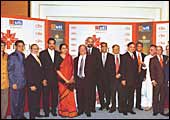 |
| Petroleum minister Aiyar: Oil's well
if it ends well |
Restructuring public sector enterprises
is always a touchy issue. And in this case, where the government
has Communist parties as allies and the PSUs in question are highly-profitable
energy companies with powerful CEOs, the subject is trickier still.
The plan, a brainchild of Petroleum and Natural Gas Minister Mani
Shankar Aiyar, involves merging Indian Oil Corporation (IOC), Oil
and Natural Gas Corporation (ONGC), Oil India and parts of GAIL.
The objective is laudable: The minister wants to create an Indian
energy giant that can take on the Exxons of the world. For instance,
the merger will produce a vertically-integrated company with Rs
1,66,076 crore in assets, Rs 1,87,245 crore in revenues, Rs 18,487
crore in profits, and a presence across the value chain of the oil
business: from oil wells to petrol stations.
Linked to that is the issue of oil security. A bigger oil giant
will have a stronger balance sheet to finance big-ticket acquisitions
abroad, and thus, ensure greater oil security to a country that
runs up an annual bill of $18.36 billion (Rs 80,784 crore), importing
almost all of the 90.4 million metric tonnes (or 660 million barrels)
of oil it consumes every year. Achieving such an objective under
the present setup, Aiyar says, is not possible. As he complained
recently at the Petrotech Conference in the capital: "There
is little coordination and virtually no pooling of the collective
strengths (of energy PSUs) for securing energy security."
Few have issues with Aiyar's objective, but several question the
means. In other words, is such a merger necessary? Rajeev Thakur,
Head of Research at credit rating agency ICRA, thinks that such
a step may backfire. His argument: deregulation (and hence competition)
of the oil market in India is too recent and the oil companies are
not prepared to compete globally since oil prices in India are still
controlled by the government. On the other hand, Thakur argues,
taking competition out in the domestic market by merging all the
oil companies (Planning Commission member Kirit Parikh has separately
suggested the creation of a mother-of-all oil companies by merging
HPCL, BPCL, IOC, ONGC and GAIL) will harm domestic consumers. A
valid point. Yet others like Subir Raha of ONGC feel that agility,
and not size, is what oil giants need to successfully compete abroad.
With political and turf battles to negotiate, Aiyar has his work
cut out. Never mind that he has the backing of Prime Minster Manmohan
Singh.
-Ashish Gupta
CRYSTAL-GAZING
Budget 2005 Primer
Just how will finance minister P.
Chidambaram's promised "dream budget" look? Hard to say
at this stage, but here's what BT learns could go into its making.
A reduction in corporate rates from 35 to 30 per cent, but an extension
of the services tax net; a hike in income tax exemption limit; a
lowering of peak import tariff to 15 per cent from 20 per cent;
country-wide implementation of a value-added tax (vat) system starting
April 1, 2005; the use of foreign exchange reserves for infrastructure
projects; and significant investments in the agriculture sector.
Does all that sound "dream budget" enough? We'll wait
for the verdict.
-Ashish Gupta
Good Times Ahead
The seventh meeting of Board of India Today
Economists (BITE) strikes a bullish note.
 |
| The Board of India Today Economists panel:
(From Left to Right) Bibek Debroy, Siddhartha Roy, Habil
F. Khorakiwala, B.K. Goenka, Indira Rajaraman, Bharat Patel,
Subir Gokarn, India Today Editor-in-Chief Aroon Purie, Shankar
Acharya, V.N. Dhoot, Anil Ambani, Jairam Ramesh, India Today
Group Editorial Director Prabhu Chawla, Adi Godrej, Ajit Ranade,
Uday Kotak, V. Sumantran and Prashant Ruia |
Put nine businessmen, six economists,
and one live-wire moderator (Rajya Sabha mp Jairam Ramesh) together
and you'd expect a multiplicity of views. Strangely enough, while
the seventh Board of India Today Economists meeting, the first to
be held in Mumbai, saw rapid-fire exchanges between the panelists
on the theme 'Made in India, For The World', everyone agreed that
India had what it takes to make it big in manufacturing.
A few argued that policy was the only thing holding India Inc.
back; others countered that Indian industry had become competitive
despite this.
The last word, however, came from Shankar Acharya, Member, 12th
Finance Commission (it actually came in the middle of the discussion).
The "easing of constraints", he offered, was the only
thing that could make India grow at China-like rates.
-Shilpa Nayak
CRANK CALLS
Abuse Redress
Help desk: "hello, how can I
help you?" Caller: "You can't, you bloody Indian..."
Such conversations are increasingly becoming routine, as the ire
against outsourcing of work to India mounts. But BPO operators may
no longer have to take such abusive callers lying down. "If
the employees of a particular company are calling, then they can
be sued," opines Diljeet Titus of law firm Titus & Co.
Concerned BPOs are fighting back. Recently, a Bangalore-based BPO
filed a complaint with the FBI. "Any unsolicited conversation
intended to demoralise business is a tort and subject to punishment,"
notes Sajan Poovayya, another lawyer. More likely, though, BPOs
will want to train their employees to better handle crank calls.
-Amanpreet Singh
Q&A
"Ideas Need Branding"
His firm
has helped companies like BP and fedex build their brand strategies.
Now, Landor Associates is looking at India Inc. On his first visit
to the country, Craig Branigan, Chairman & CEO
of Landor, spoke to BT's Priyanka Sangani
about his India plans. Excerpts:
On opportunities in India: If we enter the market at the
right time (which could be next year), we can gain a significant
portion of the market. We would initially start with Indian companies
who want to go global or those that are facing competition from
MNCs locally and want their branding and strategy to be of the same
quality as the competition's. It would initially involve a lot of
branding and design, but also strategic thinking.
On competition in India: Very often it looks like design
for design's sake. It doesn't come across like there's been much
strategic thought behind the design. If used correctly, branding
can change the way a company does business. Especially in service
companies, it makes a difference if the employees understand what
the brand is all about. You might have a big idea, but if it's not
communicated correctly, it won't matter how good the idea is.
BOP
A Bypass For Rs 10
 |
| Hrudayalaya's Shetty: A new picture |
In Karnataka,
the average occupancy of hospital beds is just 35 per cent, according
to one estimate. A state of remarkably healthy people? Hardly. Dr.
Devi Prasad Shetty, Chairman of Narayana Hrudayalaya, says the issue-like
in other parts of the country-is not availability of healthcare
infrastructure, but affordability. Therefore, to deliver healthcare
to po | 